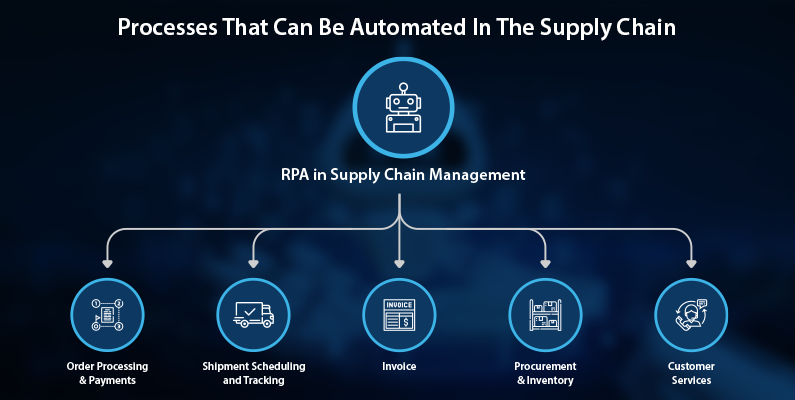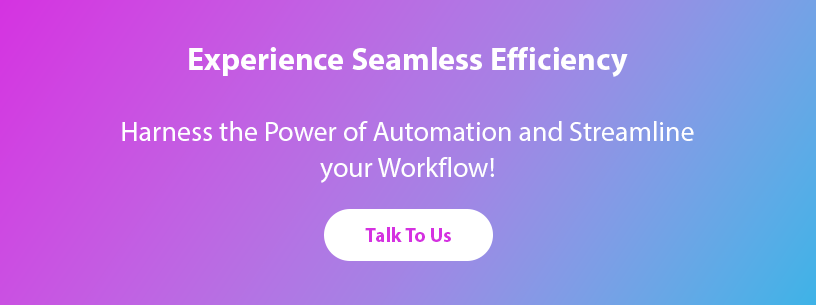Supply chain and logistics involve numerous mundane tasks like data entry, billing, collections, order processing, internal reporting, etc. Supply chain management deals with managing all these processes involved in the distribution of products to increase revenue by enhancing sales productivity, cutting down costs, and minimizing storage. AI and RPA are the technologies that can help managers achieve these goals.
Why RPA in supply chain and logistics?
Supply chain and logistics involve many processes that are manual and time-consuming. Some of the challenges that the supply chain and logistics personnel face on a daily basis are:
- Human errors caused due to manual process
- Inefficient work processes because of repeated, mundane activities
- Less productivity, more time taken to accomplish any task
- Legacy systems that are not capable of transferring data to other systems
All these challenges can be eliminated with the help of intelligent bots and AI. The list of challenges that can be addressed with the use of RPA is exhaustive. RPA can be used to automate the processes across the supply chain operations like:

Order and payment processes
The order process is the core of the order fulfilment workflow. It deals with everything from when the order is placed and received by the customer. RPA can be used to automate the processing of the desired amount by the payment gateways and send text and email to the customers regarding the confirmation of order placement.
Email automation: Bots can be deployed to make the communication of the shipment status clear to the customers, leading to a smooth experience and an increase in customer satisfaction.
Transportation & logistics management
Automate exporter’s information: A bot can be deployed to pull data from an Excel file, feeds the data into the website, and extract available information to be shared with dedicated stakeholders.
Bill of Entry for CHA – Information extraction: Bots can be deployed to scan folders, read the Bill of Entry documents in standard PDF format, extract data of items, validate information like HSN, and generate the report in CSV format.
Distance Calculation for Bill of Entry: A bot can be deployed to fetch the distance between two geographical points based on the pin code provided. This helps in identifying the exact distance between source and destination and helps organizations save cost on additional cost
- Can help you know the cost of shipment (travel cost/fuel)
- Cost of tolls
- know the time to travel (if integrated with google maps)
Calculating freight cost: RPA helps with automatically fetching the details from the railway freight website and passing the information in CSV format to the respective teams.
Shipment tracking: RPA helps in finding shipment tracking information like location and status from logistics operator portals and informs respective teams.

Invoicing
Invoice information extraction: Bots can be deployed to scan folders, read the Invoices, extract required data of the items, and generate the report in CSV format.
Invoice validation, reconciliation & processing in the import lifecycle: RPA can be very helpful in reconciling the data based on customs declaration numbers. It also helps validate the invoices by preparing reports, highlighting the discrepancy in the following three buckets:
- Transactions present in ERP & customs portal
- Transactions present in ERP but not in a customs portal
- Transactions are present in the customs portal but not in ERP
Inventory management and fulfilment process
RPA systems can detect patterns from past data on inventory and help reorder and maintain stock as per the market’s requirements. Bots can also be deployed to automate the checking of items in the warehouse, generate and validate delivery orders, send acknowledgement emails to respective parties, and fill details in ERP.
Customer service and relationship management
RPA can be used to automate customer service and relationship management by enhancing customer experience and satisfaction levels:
- RPA bots can give instant replies to any question asked by a customer.
- Bots can classify the queries department vise and send them to the respective departments.
- Customer relationship management can be automated by using RPA to perform tasks that are repetitive and voluminous.
- RPA can categorize customer data based on various parameters, which in turn can be used for different purposes.
Benefits Of RPA in supply chain and logistics
Enhanced speed of work processes: Personnel involved in the supply chain have many manual processes to carry on daily. Deploying a bot that can do the manual job of data entry, email communication, tracking the shipment, and extracting, sorting, and validating data would speed up the work and increase the focus on critical decision-making and result-oriented tasks.
Decrease operational cost: Since the deployment of bots can increase the speed of operations, organizations can save the cost on human resources while decreasing the pressure on their employees at the same time, thus saving the cost on operations and improving the work efficiency of the personnel. RPA further helps prevent costs by:
- Generating reports.
- Alerting about any changes in the estimated time of arrival.
- Identifying plausible charges related to storage.
Improved data for analysis: RPA helps in creating appropriate and accurate data. Organizations can deploy bots to go through large quantities of data to segregate valuable data. The accuracy of data extracted or created by a bot improves the quality of analysis, leading to better forecasts and minimize future risks.
Easy reconciliation of data: One can deploy a bot to compare data with the data present on different websites, PDFs, excels, etc., for generating qualitative and quantitative information that can be used to integrate processes for enhancing the overall performance of the entire supply chain system.
Efficient delivery: RPA can improve the efficiency of the delivery phase of the supply chain system. Bots can automatically assign delivery to the delivery partners based on the location of products and send information to the customers if the delivery is delayed, enhancing the customer experience with real-time order updates.
Conclusion
RPA, along with AI, has eased the life of organizations by performing all the repetitive and mundane tasks without human intervention. It’s not only economical but also efficient and structured. Supply chain managers should strive to implement RPA to keep track of logistics and update the inventory. Automation enablers like AutomationWhiz can help organizations build bots that assist their supply chain journeys and create a smooth supply chain experience.
Let Cygnet Digital be your technology partner in growth and innovation. Reach out to us today!










